Course:ASIA321/2022/Andy Lau
Introduction
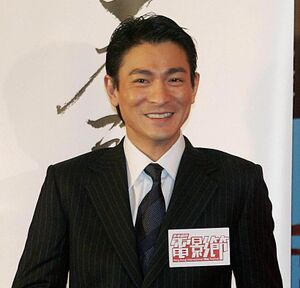
There is no doubt that Andy Lau is a household name in Hong Kong cinema and the Canto-pop industry. Not only is he representative of Hong Kong cinema but also Hong Kong as a whole. On this wiki page, we aim to present his life successes and downfalls while connecting them with the surrounding political and social contexts. We will break down how he became such an iconic symbol, starting with his beginnings in TVB, highlighting critical roles such as his character Wah Dee, and ending with critical analyses of his profession and related literature. By doing so, we can uncover his significance as a celebrity and convey his importance to our target audience: people who demonstrate an interest in Hong Kong cinema and the prominent male actors who lead the field.
Biography
Andy Lau’s career is incredibly fascinating as it has evolved in parallel with the Hong Kong film industry. His career coincides with the dynamic change in the film industry during the reunification of Hong Kong.
Andy Lau entered the entertainment industry in 1981, beginning his career as an actor by starring in TV dramas by TVB, a television broadcasting company based in Hong Kong. He then transitioned into a film actor, starring in a few early roles such as a Vietnamese refugee in Boat People in 1982. Between 1998 and 1992, Lau enjoyed the most fulfilling and abundant years of his career, making 60 films within this time period. In the 1980s and early 1990s, the Hong Kong film scene focused on mainstream, popular entertainment, producing genre films and depending on film stars. Lau took on many roles in these films and starred as gangsters and antiheroes. As such, he was typecast in an endless yet prolific cycle of roles, such as the gambling film series Casino Raiders (1989), God of Gamblers (1989), and Casino Tycoon I and II (1992). In these repeated roles, Andy Lau found the most success playing the character of a petty gangster and loveable rogue such as in A Moment of Romance (1990), where he starred as the sentimental delinquent: Wah Dee.[2]

These early films cast Andy Lau in many melodramatic roles which relied heavily on his specific image of a television soap opera idol since he was tied down and constrained by factors like his age and the type of popular films at the time. It was as if he was trapped by his image, as many of his characters looked almost identical, wearing the similar outfit of a pair of cheap Ray-ban sunglasses, sleeveless T-shirt, jeans, and cigarette dangling from his mouth. These constraints prevented Lau from expanding into other types of film genres and playing varied roles.[2] Subsequently, he was seen as an insignificant, and lightweight actor.[4] However, thanks to the producer Johnnie To, Andy Lau gradually broke free from these restrictions in the 1990s, brushing off the young, attractive, gangster image and emerging as a serious actor. Lau went on to win the Best Actor Award at the Hong Kong film Awards with Running Out of Time (1999) and Running on Karma (2003), both directed by Johnny To. The roles he played in these films stark a huge contrast with his previous young gangster roles.[2] In Running on Karma (2003), he even acted as a Buddhist monk who turned into a male stripper![4]
He was able to showcase his growth and maturation as an actor in the films Running Out of Time (1999), Needing You (2000), and A Fighter’s Blues (2000). While the Hong Kong film industry declined, Lau’s career thrived as he attempted to take on more versatile roles and expand his range by breaking into arthouse cinema and the Chinese market. He collaborated with mainland directors and acted in films like House of Flying Daggers (2004) and A World Without Thieves (2004). By this point Lau had cemented himself as one of the representative faces of Hong Kong cinema. This notoriety enabled him to act as “himself” most famously as the future CEO of Hong Kong in Golden Chicken 2 (2003).[2]
Andy Lau is phenomenal in the sense that he rode off the decline of the Hong Kong film industry to propel his own successful career. In being a by-product of the changing Hong Kong film industry, he was able to reach new heights and emerge as one of Hong Kong’s most renowned film actors.
Life roles
Early Life
Andy Lau has led an insanely fulfilling and versatile life, taking on the roles of an actor, a Canto-pop star, and a film producer. But what about his earliest life roles? Lau was born as the fourth eldest son in his family in 1961. He lived in an impoverished fishing village in Tai Po Hong Kong with his five siblings and parents. Later on, his family opened a grocery store in the city, where Lau took on different labor roles, such as writing the menu with chalk every day, and washing the dishes three to four hundred times a day. [5] Furthermore, Lau walked several kilometers 8 times a day to bring water back to his house, as it did not have proper plumbing facilities.[6] Despite his laborious lifestyle, Lau could still fulfill his duties as a full time student, graduating from Ho Lap College in San Po Kong, Kowloon. This school is a grant aided school which children of the working class attend. When Lau was 19, he gave up his education to pursue a career as an actor, signing up for an artist training program by TVB.[7]
The Handover of Hong Kong and Andy Lau’s Singing Career.
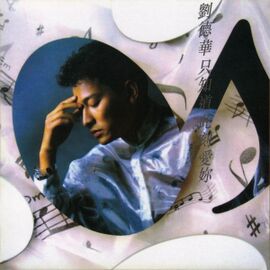
In 1985, Lau began his path as a Canto-pop singer, releasing his first single, Just Know I Only Love You, during what people consider as the Golden Age of Canto-pop. At the same time, Hong Kong was going through a period of uncertainty, as there were many negotiations over how to return Hong Kong back to Chinese Rule in the designated year of 1997. Many Canto-pop songs anchored around this topic, such as Glorious Years by Beyond, which was used as a protest song in the 90s, and Could Not Care Less About 97 by Sam Hui, which comforted people about what might come in 1997. Plagued by the unease surrounding the handover, Hong Kong’s Golden Age of singers such as Anita Mui and Leslie Cheung left the industry. This cleared the path for a new wave of singers like Andy Lau and gave him a prime opportunity to take their place.[9] And that he did because Lau went on to win his first Top 10 Gold Song Award from RTHK in 1990. From there it was an upward climb for Lau, as he won at least one RTHK category every year until 2007. He now has the Guinness World Record title for the most awards won by a male Canto-pop star, having acquired over 300 awards in his career.[10] Lau famously became dubbed as one of the ‘Four Heavenly Kings of Canto-pop’, next to big names like Jacky Cheung, Leon Lai and Aaron Kwok. The four defined the 90’s Canto-pop era and were renowned not only for their music but for their heart throbbing good looks.[9]
Film Producer
Lau set up his own production company 'Teamwork' in 1991 to make his own films, finding ample success as a producer. He famously gave leftover film stock to Fruit Chan, another Hong Kong filmmaker, who used it to make Made in Hong Kong (1997). He also produced Chan’s next independent film The Longest Summer (1998). These films won various awards such as the "Hong Kong Film Critics Society Awards" and the "Hong Kong Film Award for Best Film". For his contributions to the film industry, Lau won the title of "Asian Filmmaker of the Year" at the 2006 Pusan International Film Festival.[7] Despite the success and recognition Lau has gained as a film producer, he has also met his fair share of disputes and difficulties. In 2002, he was sued for USD 19.6 million by his partner in Team Work Corporation - CCT Telecom holdings, after backing out of a unanimous decision to float the company. Lau also allegedly broke an agreement between the companies to not to participate in any competing business by starring in Needing You (2000) and Wesley's Mysterious File (2002) for China Star Entertainment.[11] Later on, he had a financial dispute with an investor, which forced him to rename Teamwork to Focus. Currently, Focus continues to support independent films like the First Cuts scheme in 2005. Under this scheme, six feature films were produced by emerging directors form China, Hong Kong, Taiwan, Malaysia and Singapore.[2]
Screen roles
Film Career
Andy Lau made his acting debut in the tv show Till We Meet Again in 1981 and his first film Once Upon a Rainbow in 1982.[12] After that, his career has been on the rise ever since. Andy has been in more than 160 different films and more than 25 different tv shows mainly as an actor and occasionally as a producer as well. Some of his more well-known films include Internal Affairs (2002), House of Flying Daggers (2004) and Lee Rock (1991).[13] Throughout his career in the film industry, Andy also maintained a successful career in singing at the same time.
Andy Lau’s most memorable films
Every year Andy Lau organizes a fan meet hosted by “Andy World Club”, his official fan club. In the year 2020 in June, because of the pandemic, the fan meet was cancelled. However, Andy Lau was able to pre-record the event and sang some of his most famous songs to celebrate the club’s 32nd birthday. During the question and answer segment, Andy was asked to give his three most memorable films. After a few moments of consideration and thinking, Andy answered Lee Rock (1991) where he played as Lee Rock and A Moment of Romance (1990) where he played as Wah Dee and Fatso in Love on A Diet (2001). [14]
Lau explained he reprised the role of Lee Rock in the film Chasing the Dragon in 2017 which connected with the movie Lee Rock which came out more than 20 years prior in 1991. “This was a very unforgettable role. From my memory, I can’t think of many actors in Hong Kong films who were able to play the same roles after over twenty years. I think Lee Rock is a film worthy to revisit”, Lau answered the fan.
His second choice, A Moment of Romance was the film that solidified him as the leading actor. He stated to the fans, “I still miss the days when I would ride across the city with my motorcycle. I want to do a similar film, to be able to ride again…”
His third choice was playing Fatso in Love on A Diet where he had to wear fatsuits and had prosthetic makeup to play the obese character. He certainly gave the audience a different look and his expanded capabilities in acting. “It was like I was living a new life in the film,” Andy said in the event. He also mentioned that he’s still interested in making a sequel to the movie.
Films
All films from start of Andy Lau's career till ongoing today[15]
| Year | Title | Role |
|---|---|---|
| 1982 | Once Upon a Rainbow
Boat People |
Trainee
To Minh |
| 1983 | On the Wrong Track
The Home at Hong Kong |
Paul Chan
Alan Wong |
| 1984 | Everlasting Love
Shanghai 13 |
Eric
Guan Wei |
| 1985 | The Unwritten Law
Twinkle, Twinkle Lucky Stars |
Raymond Lau
Associate of Muscles |
| 1986 | The Magic Crystal
Lucky Stars Go Places |
Andy Lo
Lambo |
| 1987 | Rich and Famous
Sworn Brothers Tragic Hero |
Lam Ting-Kwok
Lam Ting-Yat Lam Ting-Kwok |
| 1988 | As Tears Go By
The Crazy Companies The Crazy Companies II The Dragon Family In the Blood Lai Shi, China’s Last Eunuch The Romancing Star II Three Against the World The Truth Walk on Fire |
Wah
Tsui Ting-Kwai Tsui Ting-Kwai Lung Ka-Wah Wah Han Ming Lau Pei Charlie Chan Raymond Lau Lam Kwok-Wah |
| 1989 | Bloody Brotherhood
Casino Raiders China White City Kids 1989 Crocodile Hunter The First Time is the Last Time God of Gamblers Little Cop Long Arm of the Law Part 3 News Attack Perfect Match Proud and Confident The Romancing Star III Runaway Blues Stars and Roses The Truth: Final Episode |
Cheung Ka-Wah
Crab Chan Roast Chicken Sas Happy Chiu Yung Michael “Dagger” Chan (Little Knife) Andy Lau (himself) Lee Cheung-Kong Turbo Lok Ka-Sing Lee Kin-Wah Lau Pei Lam Kong Lau Kai-Cho Raymond Lau |
| 1990 | Days of Being Wild
Dragon in Jail The Fortune Code Gangland Odyssey God of Gamblers II A Home Too Far Island of Fire Kawashima Yoshiko Kung Fu VS. Acrobatic A Moment of Romance No Risk, No Gain (Casino Raiders sequel) Return Engagement |
Tide
Henry Lau Wah Ying-Hung Kit Michael “Dagger” Chan (Little Knife) Little Tu (Hua Chung-Hsing) Iron Ball Fook/Cloud Mo Tak-Fai Wah Dee Big Dee Wah |
| 1991 | The Banquet
Casino Raiders II Dances with Dragon Don’t Fool Me Hong Kong Godfather The Last Blood Lee Rock Lee Rock II Savior of the Soul The Tigers Tricky Brains Zodiac Killers |
Andy Lau (himself)
Chicken Feet Lung Ka-Chun Hero Wah York Woo Big B Lee Rock Lee Rock Ching Lau Chi-Ming Che Man-Kit Ben Lee |
| 1992 | Casino Tycoon
Casino Tycoon 2 Gameboy Kids Gun n’ Rose Handsome Siblings Moon Warriors The Prince of Temple Street Savior of the Soul II The Sting What a Hero! |
Benny Ho
Benny Ho Yip Sin-Man / Wong Kau-Tai (2 roles) Andy Fishy Fei Prince Twelve / Lee Rock (2 roles) Ching Yan Simon Tam Yuen Tak-Wah |
| 1993 | Days of Tomorrow
Future Cops Come Fly the Dragon Perfect Exchange |
Fong Tak-Sing
Ti Man Chow Chun-Kit Mandy Chin |
| 1994 | Drunken Master II
Drunken Master III A Taste of Killing and Romance The Three Swordsman Tian Di |
Chang Hsueh-Liang
Yeung Kwan Ko Sau Siu Sam-Siu Cheung Yat-Pang |
| 1995 | The Adventurers
Full Throttle Pocahontas |
Wai Lok-Yan
Joe John Smith (voice) |
| 1996 | What a Wonderful World
A Moment of Romance III Shanghai Grand Thanks to Your Love |
San Chung-Wah
Lau Tin-Wai Ting Lik Wah |
| 1997 | Armageddon
Cause We are So Young Island of Greed |
Dr. Tak Ken
The man at outdoor cafe Fong Kwok-Fai |
| 1998 | A True Mob Story
The Conman |
Wai Kat-Cheung (Cheung Dee)
King |
| 1999 | Fascination Armour
Prince Charming The Conmen in Vegas Century of the Dragon Running out of Time |
Albert Lai
Wah Dee King Lung Yat-Fei (Fei Lung) Cheung Wah |
| 2000 | The Duel
Needing You A Fighter’s Blues |
Yeh Cool Son
Andy Cheung Mang Fu |
| 2001 | Love on a Diet
Fulltime Killer Dance of a Dream |
Fatso
Lok Tok-Wah Namson Lau |
| 2002 | Fat Choi Spirit
The Wesley’s Mysterious File Internal Affairs Golden Chicken Black Mask 2: City of Masks |
Andy
Wesley Lau Kin-Ming Andy Lau (himself) Prophet (voice) |
| 2003 | Love Under the Sun
Cat and Mouse Give Them a Chance Running on Karma Internal Affairs III Golden Chicken 2 |
Bellhop captain (also director)
Zhan Zhao Andy Lau (himself) Big Lau Kin-Ming Andy Lau (himself) |
| 2004 | Magic Kitchen
Jiang Hu McDull, Prince de la Bun House of Flying Daggers Yesterday Once More A World without Thieves |
Chuen Yao
Hung Yan-Chau McBing (voice) Captain Leo Mr. Theif Wang Bo |
| 2005 | Wait Til You’re Older
All About Love |
Chan Chi-Kwong
Dr. Ko / Derek Hui (2 roles) |
| 2006 | I’ll Call You
My Mother is a Belly Dancer A Battle of Wits |
Muscle Guy / Warden 333 (2 roles)
Adili Ge Li |
| 2007 | Protege
Brothers The Warlords |
Lam Kwan
Chief Inspector Lau Zhao Erhu |
| 2008 | Three Kingdoms: Resurrection of the Dragon | Zhao ZiLong |
| 2009 | Look for a Star
The Founding of a Republic |
Sam Ching
Yu JiShi |
| 2010 | Future X-Cops
Detective Dee and the Mystery of the Phantom Flame |
Kidd Zhou
Di RenJie |
| 2011 | Shaolin
What Women Want The Founding of a Party A Simple Life |
Hou Jie
Sun ZiGang Cai E Roger Leung |
| 2012 | Cold War | Phillip Luk |
| 2013 | Switch
Blind Detective Firestorm |
Xiao JinHan
Johnston Chong Lui Ming-Chit |
| 2014 | Golden Chicken 3 | Andy Lau (himself) |
| 2015 | From Vegas to Macau II
Lost and Love Saving Mr. Wu Our Times |
Michael “Dagger” Chan (Little Knife)
Lei ZeKuan Mr. Wu Andy Lau (himself) |
| 2016 | The Bodyguard
From Vegas to Macau III The Great Wall Railroad Tigers |
Li Zheng-Jiu
Michael “Dagger” Chan (Little Knife) Strategist Wang Little boy’s father |
| 2017 | Shock Wave
Chasing the Dragon |
Cheung Choi-San
Lee Rock |
| 2019 | The White Storm 2: Drug Lords
Fagara |
Yu Shun-Tin
Kwok Tin-Yan |
| 2020 | Find Your Voice
Shock Wave 2 |
Joseph Yim
Poon Sing-Fung |
| 2021 | Endgame
Detective Chinatown 3 |
Zhou Quan
Q |
| TBA | Hong Kong Land
Angels of the Pandemic Once Upon a Time in Hong Kong Crisis Route The Wandering Earth 2 Something About Us Sacred Seven |
Liu Kin
Doctor ICAC Investigator Gao HaoJun TBA Lau Wei-Chi Sun WuKong |
TVs
All TV shows from start of Andy Lau's career till going today[15]
| Year | Title | Role |
|---|---|---|
| 1981 | Till We Meet Again
Hong Kong’81 The Lonely Hunter Two People Three Feet The Young Heroes of Shaolin The Shell Game |
Lung
Ngai Kim-Sing Student Waiter Shaolin disciple Lung’s bodyguard |
| 1982 | Kid Troupe
The Restless Trio The Legend of Master So The Emissary |
Wan Hoi
Chin Yat-Tim Man Tit-Ho Kong Tai-Wai |
| 1983 | My Way
The Old Miao Myth Crossroads: A Decision The Return of The Condor Heroes |
Lee Chi-Ho
Tse Seung-Cho Ma Yat-Ning Yeung Kuo |
| 1984 | The Duke of Mount Deer
The Other Side of the Horizon The Return of Wong Fei Hung |
Emperor Hong-Hei
Fu Ching-Wan Lam Sai-Wing |
| 1985 | Hong Kong’85
The Last Performance Take Care, Your Highness! The Yang’s Saga |
Ngai Kim-Sing
Yip Chin-Lung Emperor Kin-Lung Yeung Yin-Chiu |
| 1986 | The Heavenly Swordsman and the Spoiled
Heir to the Throne is… |
Kei Chun
Koon Chung-Yuen |
| 1988 | Sky Wolf’s Calmity | Pak Lung |
| 1992 | Modern Love Story
The Thief of Time |
Wai / Cheung (2 roles)
Yeung Kuo |
| 2018 | The Trading Floor | (producer only) |
Substantive analysis of the celebrity's profession
Film Analysis
Internal Affairs (2002)

Andy Lau starred in the complex emotional movie, Internal Affairs made in 2002. He played as Lau Kin Ming alongside Tony Leung who played as Chan Wing-Yan. This film is about Lau, a gang member who goes undercover to infiltrate the police force and Chan, a police officer who goes undercover to infiltrate the gang. However, they’ve both been pretending to live each other’s lives for more than 10 years to the point where the fake performances become reality. Lau gradually behaves more like a good cop and Chan becomes more like a gang member. They both struggle with their own identities and the truth of their lives. The idea of this film was made so well that it resulted in Hong Kong’s most successful production during that time. Hollywood also appreciated the idea so much they made their own The Departed in 2006 directed by Martin Scorsese which was a loose remake of Hong Kong’s film. [16]
Andy Lau displays a great performance in the film playing the undercover for the gang. He shows us someone who struggles with who they are after pretending to live a different life for a decade. Andy’s character, Lau Kin Ming’s fiancée, Mary, who is a writer was writing a book about a person with a personality disorder and can’t seem to figure out who they are. This mirror Lau’s situation and we can see that through the character’s internal struggles when he was told about the book by Mary. Overall, we can see excellent character development performed by Andy making the audience on the edge not knowing if they should support the character or root against him.
Andy Lau’s success in the film industry
Andy Lau has been one of Hong Kong’s as well as mainland China’s biggest film actors ever since the mid-1980s. His success in Hong Kong’s film industry has been on the rise and never slowed down. It’s reported in 2005, Lau was awarded "#1 Box Office Actor from 1985 – 2005" in Hong Kong, yielding a total box office of 1.7 billion Hong Kong dollars for shooting 108 films during the 20 years. This amazing figure at the time of the award topped Stephen Chow at 2nd place with 1.3 billion HKD and Jackie Chan at 3rd place with 894 million HKD.[17] For this achievement, a wax figure of Andy Lau was unveiled on June 1st, 2005 at the wax museum “Madame Tussauds Hong Kong”. Also in 2007, the Nielsen Company awarded Lau as the “Nielsen Box Office Star of Asia”.
Andy Lau’s success in the music industry
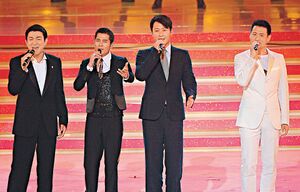
Aside from Andy’s long-time acting career, he has also maintained a successful career as a singer. Lau released his first album in 1985 called “Only Know that I Still Love You”. Although the album was not a big hit, Lau stayed close to the music industry and released another album in 1990 called “Would It Be Possible” which resulted in a chartbuster that kickstarted Lau’s flourishing career as a singer.
Later in the 1990s, the media and the people named Andy Lau one of the “Four Heavenly Kings of Cantopop” alongside Aaron Kwok, Jacky Cheung and Leon Lai. Some of Andy Lau’s hit songs include “Everlasting Love”, “If You Are My Legend”, “Love You for 10,000 Years” and “Chinese People”.[17]
Since 1992, Lau has appeared in concerts more than 180 times. On top of that, Lau also entered into Guinness World Record for "Most Awards Won by a Cantopop Male Artist". By April 2000, he had already won a total unprecedented 292 awards, for a singing career that officially started in 1988. Andy also writes lyrics and composes music for not only himself but for other singers as well. He also sang alongside Jackie Chan for the 2008 Summer Olympics closing ceremony and led other performers in singing the song "Everyone is No.1" in the Beijing National Stadium just a few hours before the 2008 Paralympics opening ceremony to show his support for the disabled athletes.[18]
Reception of the celebrity
Ever since the start of Andy Lau’s career, he’s received much positive support from his fans. Being named part of the “4 heavenly kings of cantopop” in the 1990s when his career started in 1982, proved that he earned his recognition early on. While Lau has a loyal fandom following him, giving him love and support, it has never been just a one-way street. Andy Lau also has put in great effort to respond and give back to his fans.
Interaction with long-awaiting fan
One example out of the many was at one of his fan-meets in Hong Kong. As reported by “CNA Lifestyle” and also captured on video, Andy Lau was signing autographs and taking pictures with a huge crowd. As expected, it was loud and almost chaotic. A fan was shouting and pushed his way up to Lau but was being held back by the security guards. The fan tried to tell him he waited for 8 hours just to meet him. Instead of denying him because of his debatable behaviours, Lau first managed to silence the massive crowd with a simple gesture of putting his finger on his lips. He then welcomed the fan, patted his shoulders, calmed the man, and wrapped his arm around the fan’s shoulders for a photo together. This was captured on video and went viral on the internet. As a result, Lau received a lot of praise online from other fans for his “friendly gratitude” and according to many fans, he had “no look of displeasure at all”.[19]
Online Concert for his fans

Another event that happened recently in September of 2022 was an online concert Andy Lau held on Douyin, the Chinese version of TikTok. Andy Lau started his account on Douyin in early 2021 and attracted more than 12 million followers before the official announcement of the account and now has more than 45 million followers after the news was announced to the public by Lau.[20]
Due to the pandemic, Andy Lau live-streamed his concert online on Douyin and within the first half hour of the concert, it already attracted more than 100 million viewers. Amazingly, the concert which lasted two hours sets a shattering record of 350 million viewers and another 60 million viewers watching the replay the day after totalling the number at around 410 million viewers. Before performing the very well-known song of his Love You for 10,000 Years, Andy Lau said to his online audience, “I can’t see you face to face today, but I can still feel your love”. In between his songs, Lau also told his viewers “Every time I’m on stage, I hope I can make real eye contact with you [the audience]. I hope that soon there will be no more pandemic in the world, so I can get close to you [the audience] to perform.”[21]
Online “fan-service” concerts has quickly been on the rise since the start of the pandemic. In May of 2022, Jay Chou also held two concerts online having 47 million viewers and 25 million for the first and second concert. Late June of 2022, famous US band, Backstreet Boys also had an online concert with about 44 million WeChat viewers. However, these impressive numbers still do not compare to Lau’s 400+ million viewers. Andy Lau’s Douyin account also increased to 77 million followers following his concert.[21]
It’s no doubt that Andy Lau maintains a healthy and positive image to the public and therefore attracts many loyal fans. It’s unheard of that Lau has been in public dramas or scandals which also factors into why he’s held his success for so long and will undoubtedly continue. He also interacts with his fans with his official fan club called “Andy World Club” and has fan-meets almost every year and will continue to grow his supportive fandom.
Critical literature review
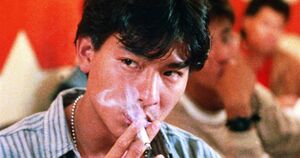
From Wah Dee to CEO: Andy Lau and Performing the Authentic Hong Kong Star by Leung
Leung mainly focuses on the changes in the entertainment industry in Hong Kong, and has used Andy Lau as an important example. In Hong Kong in the 1960s and 1970s, "television" was used as an entertainment medium, becoming a drama series actor seemed to be the only way to become a star. When the time came to the 1980s and 1990s, the film and idol industries in Hong Kong reached their peak. Andy Lau, as a star in the 1980s, was evenly involved in film, television, and singing. A a student from the TVB (Television Broadcasts Limited) training class, he also has a wealth of skills in dance, performance, art attack and defense, etc. After graduating from this course, Andy Lau successfully became a film actor. "Wah Dee", was an early role played by Andy Lau in A Moment of Romance (1990); however, due to his past idol image in soap operas, movie roles were limited. His image in the minds of the public has even been finalized. In the 1990s, Liu ushered in success in Johnnie To's films. Andy Lau successfully shed his previous image and received the Best Actor Award at the Hong Kong Film Awards. In subsequent films, Liu showed maturity and stability as an actor. Lau can be said to be a model for many media stars in the Hong Kong entertainment industry. He has successfully achieved good results in TV dramas, movies and singing careers, and has not been knocked down by the transformation of the media industry.[2]
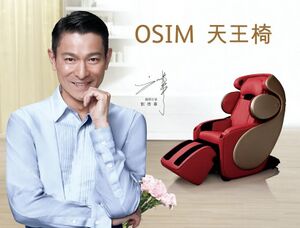
Perception of Advertisements with Celebrity Endorsement among Mature Consumers by Chan and Fan
Kara Chan and Fei Fan point out the impact of celebrity endorsements on consumers and marketing in the journal, and indicate celebrities such as Andy Lau as examples. Chan and Fan learn through interviewees that Andy Lau's Osim massage chair ad was one of his most influential. Since Andy Lau's personal image is one of the "Four Heavenly Kings" in Hong Kong, it fits with the concept of Osim's “Heavenly King chair” (Tian Wang Chair) and is therefore loved by the public. The journal also points out that the image of the celebrity seems to directly affect the way how the public feel about this product. If the celebrity's image is closer to the product, the credibility and similarity will also be greatly improved, so it will be more embedded in the hearts of the public. Andy Lau has achieved good results in the endorsement of Osim's "Heavenly King Chair", and the image of the spokesperson is also deeply remembered by the public.[22]
Postcolonial Hong Kong Cinema: Utilitarianism and (Trans)Local by Pang
In the journal, Pang points out the transformation of Hong Kong's cinema industry after the 1997 handover. He states, Hong Kong's film industry was seriously affected by the Chinese mainland market after the handover. Hong Kong film companies also began to shift their focus to mainland China because of this reason, and gradually paid less attention to the original culture of Hong Kong films. Pang cited Andy Lau's movie "A Battle of Wits" as an example, the Hong Kong box office of the film is only a quarter of that of mainland China. However, Andy Lau's personal image and status obviously helped the film's marketing and helped “brand” the film. Even if Hong Kong cinema has moved towards another form of "pan-Chineseness", Hong Kong superstar actors, including Tony Leung, Andy Lau and Chow Yun-fat, etc., still occupy an extremely important position in Chinese-language films. They often play important roles in Chinese-language films, including playing the leading role, being a producer, being an investor, etc. Hong Kong's core position in the film industry has not been affected by changes in the mainland because of the handover.[23]
Mediated Persona’ and Hong Kong Stars: Negotiating Mainland Celebrity by Weiss
Amanda Weiss describes how two Hong Kong superstars, Jackie Chan and Andy Lau, attracted the mainland market. Obviously, they two have very different approaches, Andy Lau focuses more on the local Asian market; Jackie Chan, on the contrary, has developed to the world. Weiss states, “Local actor/singer star Andy Lau and international action-film star Jackie Chan”. Especially since the handover in 1997, Jackie Chan is famous for wearing Chinese clothes and being active in the Western market, and he strongly praises the political policies of the mainland; on the other hand, Andy Lau, who also plays a "Chineseness" role in the mainland, but on the contrary, to the political issues have always remained neutral and do not express his political position. Therefore, while not taking his acting career globally, his image has been strengthened in Asia , “since it appeals to Chinese consumer dreams and moral ideals”.[24]
Andy Lau and "Chinese Identity": Cultural Nationalism, Mass Media and Commercial Rationality
Since 1992, China has launched the socialist new market economy goal, and has developed rapidly in material and hardware. At this time, Hong Kong's popular culture has developed in a mature and diverse direction; it also includes the "Idol Industry". Among the idol industry, the "Four Heavenly Kings" are even more influential. However, the idol industry at this time must take into account the mainland's policies and integrate into its business activities. Since the Handover of Hong Kong, the cultures of China and Hong Kong have collided. Hong Kong represents prosperity, modernity and individual spirit. For the CCP, it is the best partner to reshape the regional and international image. In the song "Chinese People", Andy Lau praises Hong Kong's return and patriotism. There are a lot of metaphors in the lyrics, including “Five Thousand Years”, “Yellow skin”, etc. in describing China.
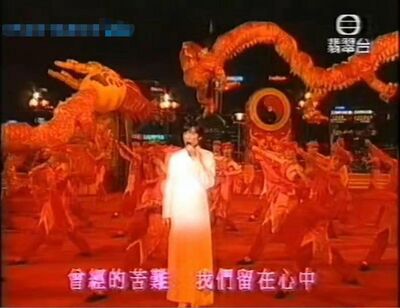
Lyrics of "Chinese People":
中國人
詞:李安修 曲:陳耀川 編曲:涂惠元/江港生
五千年的風和雨啊 藏了多少夢
黃色的臉黑色的眼 不變是笑容
八千里山川河嶽 像是一首歌
不論你來自何方 將去向何處
一樣的淚 一樣的痛
曾經的苦難 我們留在心中
一樣的血 一樣的種
未來還有夢 我們一起開拓
手牽著手 不分你我 昂首向前走
讓世界知道我們都是中國人
This song is also became very popular after the "Hong Kong Handover Extravaganza" (龍的光輝——香港回歸大匯演). In the program, a large number of Chinese elements have been added, including Chinese gongs and drums, flying dragons, etc., and because of this performance, Andy Lau’s title has changed from the "Four Heavenly Kings" to a “Wide Range of Chinese Areas Famous Idol”. Andy Lau has gained widespread recognition because his image is not limited to singer. Lau's image in film and television works is mostly related to heroes and heroic characters, which is also one of the key points.[25]
Critical debates
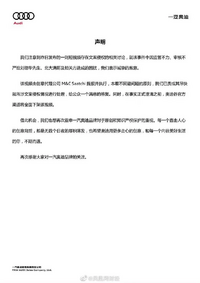
Andy Lau's image is well recognized perfect that he has the title of "Zero Negative Review" idol. In his about 40 years of acting career, there have been only a few controversies or negative public opinions.
Advertisement of Audi Accused of Plagiarism, Andy Lau's First Response
On May 21, 2022, Andy Lau's Audi "high-quality" advertisement was accused of plagiarism. The plagiarism controversy was accused by a TikTok blogger with more than 3 million followers, “Bei Da Mange” (北大滿哥), who said that the content of Andy Lau's advertisement was copied from a copy he wrote in May 2021. After comparison, it is found that not only the copywriting is similar, but also the poems of Zeng Guofan (曾國藩) quoted by Andy Lau after the advertisement. Audi apologized for the incident and removed the advertisement from the official platform as soon as possible. Andy Lau also posted: "I have 100% respect for the original, this incident, for the problems that the advertising team had in the creative process and the trouble it caused to Mange, I personally deeply regret that Audi and the advertising company have now It is being dealt with seriously”, (對原創我是百分百的尊重,今次事件,對於廣告團隊在創作過程中出現的問題,以及對滿哥造成的困擾,我個人深感遺憾Audi和廣告公司現正認真處理中。). Audi's official statement also stated that the incident had nothing to do with Andy Lau himself.[26]
Conclusion
Andy Lau will always be one of the most significant and well-known celebrities in Hong Kong and mainland China. His acting performances in more than 160 films and over 25 tv shows have solidified him as a great actor. On top of that, there is a reason he is one of “The Four Heavenly Kings of Canto-pop”. Millions of fans still tune in to his concerts and songs that will always last through time with us. Lau continues to interact with his fans through his official fan club and organizes different events every year to reach out to his fans.
Through his hard work and perseverance, Andy Lau was able to become the established singer and actor he is today. He emanates a duck in water in both the acting and singing fields. His extraordinary talent is what made him an undefeatable force which withstood the decline of the Hong Kong film and television industry. In addition to his great success in acting and singing, he still has a great public presence. Commercial endorsements are constant, and the endorsed products will also emphasize his image of "Heavenly King" and "High Quality", from which we can see the public's love for him. Andy Lau has and will continue to expand his name in the media and show exponential growth in celebrity culture.
References
- ↑ Clarke, Mike (24th February 2005). "Hong Kong Singer and Actor Andy Lau". gettyimages. Retrieved 10th November, 2022. Check date values in:
|access-date=, |date=(help) - ↑ 2.0 2.1 2.2 2.3 2.4 2.5 Leung, Wing-Fai (2009). "From Wah Dee to CEO: Andy Lau and Performing the Authentic Hong Kong Star". Film International. 7, no.4: 19–28.
- ↑ Clarke, Mike (24th February 2005). "Hong Kong Singer and Actor Andy Lau". gettyimages. Retrieved 10th November, 2022. Check date values in:
|access-date=, |date=(help) - ↑ 4.0 4.1 "Hong Kong's Prime Movers A-Z". Made In Hong Kong II. 50: 32–41. May - June 2014 – via ProQuest. Check date values in:
|date=(help) - ↑ "In Andy Lau's childhood, he was beaten by his father for playing poker. He only got 8 points in English". INEWS. November 1rst 2022. Retrieved November 10th 2022. Check date values in:
|access-date=, |date=(help) - ↑ "Andy Lau Success Story". SuccessStory. May 28th, 2021. Retrieved November 10th, 2022. Check date values in:
|access-date=, |date=(help) - ↑ 7.0 7.1 "How Did Andy Lau Get Discovered + Net Worth". Gemtracks. November 10th, 2022. Retrieved November 10th, 2022. Check date values in:
|access-date=, |date=(help) - ↑ Lau, Andy (May 29th 1985). "Andy Lau "Just Know That I Love You" CD Cover". qobuzz. Retrieved November 10th 2022. Check date values in:
|access-date=, |date=(help) - ↑ 9.0 9.1 Tang, Ling (July 10th, 2019). "How the Handover of Hong Kong Put Cantopop on Mute". Culture Trip. Retrieved November 10th 2022. Check date values in:
|access-date=, |date=(help) - ↑ Chan, Cherry (November 5th 2021). "'Four Heavenly Kings' of Hong Kong – net worths, ranked: how much have Canto-pop legends Andy Lau, Jacky Cheung, Leon Lai and Aaron Kwok raked in since their 90s heyday?". South China Morning Post. Retrieved November 10th, 2022. Check date values in:
|access-date=, |date=(help) - ↑ Shackleton, Liz (3rd July 2002). "Andy Lau being sued for $19.6m". Screen Daily. Retrieved November 10th 2022. Check date values in:
|access-date=, |date=(help) - ↑ "Andy Lau". Rotten Tomatoes. Retrieved November 4th, 2022. Check date values in:
|access-date=(help) - ↑ Park, Min Ji (September 22nd, 2022). "9 Best Andy Lau Films You Should Watch". Localiiz. Retrieved November 2nd. Check date values in:
|access-date=, |date=(help) - ↑ "Andy Lau Shares His Three Most Unforgettable Film Roles". Jayne Stars. June 19th, 2020. Retrieved October 30th.
|first=missing|last=(help); Check date values in:|access-date=, |date=(help) - ↑ 15.0 15.1 "Andy Lau - IMDb". IMDb. Retrieved November 4, 2022.
- ↑ Ebert, Roger (December 23rd, 2004). "'Infernal Affairs' offers rare emotional depth". RogerEbert.com. Retrieved November 2nd. Check date values in:
|access-date=, |date=(help) - ↑ 17.0 17.1 O'Hara, Helen. ""Andy Lau biography"". Empire. Bauer Media Group. Retrieved October 28th. Check date values in:
|access-date=(help) - ↑ "Chinese Music - Andy Lau". Chinese Expats. December 4th, 2010. Retrieved November 1st. Check date values in:
|access-date=, |date=(help) - ↑ "Andy Lau's Magic Touch Calmed Agitated Fan Who Waited 8 Hours to Meet Him". CNA Lifestyle. June 27th, 2021. Retrieved November 4th. Check date values in:
|access-date=, |date=(help) - ↑ Ruey Yan, Lim (January 30, 2021). "HK Singer-Actor Andy Lau's Douyin Account Attracts More than 45 Million Followers". The Straits Times. SPH Media Limited. Retrieved November 4th. Check date values in:
|access-date=(help) - ↑ 21.0 21.1 Cao, Ann (September 4th, 2022). "Hong Kong's Andy Lau Breaks Own Online Concert Audience Record on Douyin". South China Morning Post. Retrieved November 4th. Check date values in:
|access-date=, |date=(help) - ↑ Chan, Kara; Fan, Fei (2020). "Perception of Advertisements with Celebrity Endorsement among Mature Consumers". Journal of Marketing Communications. 28, no. 2: 115–131.
- ↑ Pang, Laikwan (2007). "Postcolonial Hong Kong Cinema: Utilitarianism and (Trans)Local". Postcolonial Studies. 10, no. 4: 413–430.
- ↑ Weiss, Amanda (2013). "Mediated Persona' and Hong Kong Stars: Negotiating Mainland Celebrity". Celebrity Studies. 4, no. 2: 219–232.
- ↑ Mo, Chen (May 5, 2017). "Media.Modernity.Fandom: A Study of Hong Kong Popular Music in Mainland China (1992-2015)". 劉德華與「中國人身份」:文化民族主義、大眾媒介與商業理性: 24–68. line feed character in
|title=at position 71 (help) - ↑ 林, 呈育 (2022 May 22). "奧迪廣告遭控抄襲 劉德華首發聲回應". 三立新聞網. Check date values in:
|date=(help)
Sharing
| This resource was created by Course:ASIA321. |
